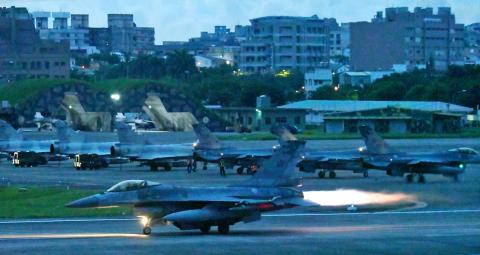The armed forces yesterday held large-scale air, land and sea exercises throughout the nation, with eight fighter jets from Hualien Air Base conducting simulated long-range and duration intercept missions.
Units from all branches of the military took part in the Joint Air Exercise from 5am to 8am in response to a simulated Chinese invasion.
The drill put into practice air and anti-air components of the war plan, which the armed forces had drawn according to experience derived from past Han Kuang military exercises, an official said on condition of anonymity, adding that the exercise coincided with and tied into the Joint Electronic 107-2 Exercise.

Photo: Yu Tai-lang, Taipei Times
The aerial component of the drills was unusual in the number of aircraft and the amount of equipment involved, as six Lockheed Martin F-16s and two Dassault Mirage 2000s flew with a full load of missiles, ALQ-184 electronic attack pods and double drop tanks, the official said.
Ground crew began preparations at 4am and the fighter jets took off at 5:40am.
Additionally, four Indigenous Defense Fighters simulated an emergency landing from Taichung’s Ching Chuan Kang (清泉崗) Air Base to Hualien Air Base, sources said.
The navy deployed Kidd-class destroyers, and Cheng Kung and Kang Ding-class frigates in anti-air maneuvers at multiple zones, while the army fielded anti-air units to assist in the defense of air bases.
The Joint Air Exercise is a combination of routine drills that are conducted in a way that is simultaneous and coordinated according to a specific military scenario whose details are classified, the official said.
While simulated fighter interception is commonplace, the air drills that took place yesterday were much larger than previous joint air exercises, the official said.
In response to the rising military threat from China, Southeast Asian nations and the US have been bolstering their defenses with joint military exercises and Taiwan should not be an exception, the official said.
The armed forces are to increase the frequency and realism of the nation’s military drills through the institution of an operational preparedness month and other measures, the official said.

AGING: As of last month, people aged 65 or older accounted for 20.06 percent of the total population and the number of couples who got married fell by 18,685 from 2024 Taiwan has surpassed South Korea as the country least willing to have children, with an annual crude birthrate of 4.62 per 1,000 people, Ministry of the Interior data showed yesterday. The nation was previously ranked the second-lowest country in terms of total fertility rate, or the average number of children a woman has in her lifetime. However, South Korea’s fertility rate began to recover from 2023, with total fertility rate rising from 0.72 and estimated to reach 0.82 to 0.85 by last year, and the crude birthrate projected at 6.7 per 1,000 people. Japan’s crude birthrate was projected to fall below six,

Conflict with Taiwan could leave China with “massive economic disruption, catastrophic military losses, significant social unrest, and devastating sanctions,” a US think tank said in a report released on Monday. The German Marshall Fund released a report titled If China Attacks Taiwan: The Consequences for China of “Minor Conflict” and “Major War” Scenarios. The report details the “massive” economic, military, social and international costs to China in the event of a minor conflict or major war with Taiwan, estimating that the Chinese People’s Liberation Army (PLA) could sustain losses of more than half of its active-duty ground forces, including 100,000 troops. Understanding Chinese

US President Donald Trump in an interview with the New York Times published on Thursday said that “it’s up to” Chinese President Xi Jinping (習近平) what China does on Taiwan, but that he would be “very unhappy” with a change in the “status quo.” “He [Xi] considers it to be a part of China, and that’s up to him what he’s going to be doing, but I’ve expressed to him that I would be very unhappy if he did that, and I don’t think he’ll do that. I hope he doesn’t do that,” Trump said. Trump made the comments in the context

SELF-DEFENSE: Tokyo has accelerated its spending goal and its defense minister said the nation needs to discuss whether it should develop nuclear-powered submarines China is ramping up objections to what it sees as Japan’s desire to acquire nuclear weapons, despite Tokyo’s longstanding renunciation of such arms, deepening another fissure in the two neighbors’ increasingly tense ties. In what appears to be a concerted effort, China’s foreign and defense ministries issued statements on Thursday condemning alleged remilitarism efforts by Tokyo. The remarks came as two of the country’s top think tanks jointly issued a 29-page report framing actions by “right-wing forces” in Japan as posing a “serious threat” to world peace. While that report did not define “right-wing forces,” the Chinese Ministry of Foreign Affairs was